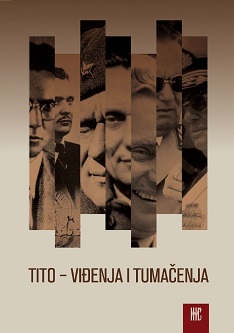Albanska manjina u Titovoj Jugoslaviji kao faktor u jugoslovensko-albanskim odnosima (1945-1953)
The Albanian Minority in Tito's Yugoslavia as a Factor in the Yugoslav-Albanian Relations (1945-1953)
Author(s): Marijana Stamova
Subject(s): Civil Society, Political history, WW II and following years (1940 - 1949), Inter-Ethnic Relations, Ethnic Minorities Studies, Sociology of Politics
Published by: Institut za noviju istoriju Srbije
Keywords: Josip Broz Tito; Enver Hodzha; Yugoslavia; Yugoslav federation; Albania; Kosovo; The Albanian issue; The Albanian minority; The Yugoslav-albanian relationship; KPY; KPA; USSR; Stalin;
Summary/Abstract: From 1945 onwards the Albanian minority in Yugoslavia played an important role in shaping Yugoslav-Albanian relations. Tito's „Balkan" ambitions certainly shouldn't be forgotten. Namely after WWII, as the result of his role in it, Tito had the ambition of imposing himself as an absolut leader of Yugoslavia, but also of the Balkans. An idea of a Balkan federation with his and Yugoslav dominant position in it, was acceptable for him. In these combinations he certainly also counted on the Albanian factor which wasn't negligeable in Yugoslavia. No doubt that the Albanian minority problem in Yugoslavia influenced the overall Yugoslav-Albanian relations and the stability of Yugoslavia, not only during the first ten-odd years after the war, but also later. This is proven by the very fact that Albania played - sometimes covertly, and sometimes quite openly - the role of the patron of the Albanians in Yugoslavia under the guise of policy of protecting the rights of the Albanian national minority in Yugoslavia. This caused occasional Tito's horse-trading with the population of the Albanian national minority, particularly in Kosovo where it was most numerous. During WWII the Communist Party of Yugoslavia and Tito aided the foundation and work of the Communist Party of Albania, as well as the development of the liberation movement. Tito's envoys Miladin Popović and Dušan Mugoša worked there for a long time. During the ten-odd years after the war the Yugoslav-Albanian relations developed in two stages. The first one from the liberation to 1948 and the second one from 1948 to 1953. During the first phase Tito's aid to Albania was even larger than during the wartime years. Yugoslavia contributed to Albania's international recognition and extended considerable economic help to it Tito was praised and treated almost as a real Albanian leader. The second phase started in 1948, i.e. after Tito's conflict with the USSR, Stalin and the Informbuerau. The first to disown Tito was the USSR, accusing him of the intention of annexing Albania, for which he deployed divisions of the Yugoslav army there. Accepting Stalin's orders, the Albanian leadership headed by Enver Hoxha severed all relations with Yugoslavia and launched an open campaign aganst it To be sure, the propaganda of the countries that had fallen to Stalin's block also joined 260 in. Albania's relation to Yugoslavia found support also in Bulgaria, for which we adduce several examples. The solution of the national question and allegedly insufferable situation of the Albanian minority in Yugoslavia particularly came under attack. The Albanian minority was constantly instigated to dissatisfaciton by the Albanian leadership, often evincing that dissatisfaction in various ways which constantly spoiled the bilateral relations between the two neighboring countries. After Stalin's death Albania unwillingly accepted Yugoslavia's reconciliation with the countries of „people's democracy" and it continued its instigating policy by utilizing the Albanian minority in Yugoslavia. It is the fact that Albania, in order to acheive its goals through the Albanian minority, never returned to reconciliation with Yugoslavia until 1953.
Book: Tito - Viđenja i tumačenja
- Page Range: 247-261
- Page Count: 15
- Publication Year: 2011
- Language: Serbian
- Content File-PDF

